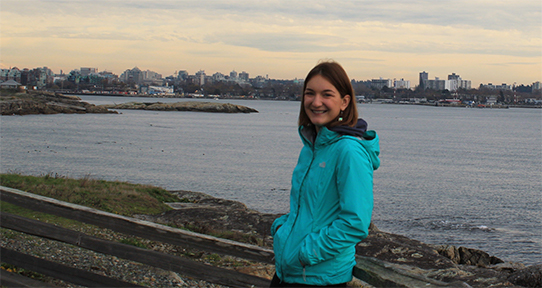Richel Donaldson

Talking Circles
Talking Circles give everyone their turn to speak, and allow all voices to be heard in a respectful and attentive way. In a Talking Circle, everyone is equal and everyone belongs. The intention is to open hearts and allow connection and understanding between participants. Talking Circles are a traditional practice for many aboriginal communities.
UVic student Richel Donaldson grew up hundreds of miles from her Indigenous ancestors, the Kitsumkalum tribe of the Tsimshian Nation in Northern BC. It wasn’t until she took an Indigenous feminisms course in her second year, that she started to ask questions about the lived experience of her mom, grandma and other women in her family. Through the LE, NONET program, Richel learned about working respectfully within Indigenous communities, and began to understand how she could be a part of a reciprocal community through her academic research.
Conducting research through an engaged process
This was front of mind as she prepared for her political science honour’s research analyzing the disparity between how the Canadian state articulates equality and how Indigenous women actually experience inequality.
“I knew it was important to get a first-hand perspective,” she says. “And that the process had to be directed by the communities I was working with, rooted in Indigenous practices rather than western academic methodology.”
To honour this, Richel adopted the practice of Talking Circles. In keeping with tradition, she would provide food and gifts for the participants and elders involved in her three circles. She applied for scholarships to cover those costs, which would otherwise have to come out of pocket. She was awarded the Walter D. Young Scholarship, which was created by friends and former students of the former Chair of political science. The funding allowed her to conduct her research in a way she felt and knew to be right. “I wouldn’t have been able to conduct that form of research without the scholarship,” she says. Richel believes it had a direct impact on the success of her research.
“The conversations that took place in the talking circles felt like everyday conversations, but they reflected the complex theories of oppression I’d been learning about in class,” says Richel. “I realized the women in my groups had an intrinsic understanding of oppression, through their own lived experiences.”
The continuous circle
After completing her thesis, Richel continued working with Indigenous communities through the Centre for Indigenous Research and Community-Led Engagement (CIRCLE), and this January, she began the BC Legislative Internship program, which was actually founded by Walter Young.
“My Indigenous community has supported my academic experience, and I know I will find a way to contribute back to them. I feel the same responsibility to the donors. Their support didn’t just help me. Through me, it will have an effect on the wider community.”
